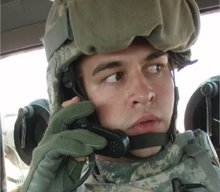As Coalition forces in Iraq have moved to a doctrine centered more on counterinsurgency and begun to engage the sheikhs, the military has relied more and more on security forces supplied by local sheikhs to point out bad guys, weapon caches, and IEDs. In Arab Jabour, those forces are called Sons of Iraq.
Sayifiyah, in southern Arab Jabour, had local villagers trying to start a Sons of Iraq program before US forces even reached their village.
Al Qaeda in Iraq has long been the only power in much of Arab Jabour, and the people of Sayafiyah were fed up. At the start of January, a group of sheikhs from the area traveled to meet Colonel Ferrel, the commander of the 2nd Brigade Combat Team, 3rd Infantry Division to ask for help in their village. They talked about the many things that they needed, and about their desire to use Sons of Iraq to secure their village. Colonel Ferrel asked for a volunteer from among the sheikhs to head the Sons of Iraq when he reached their village. The sheikhs looked at each other indecisively, until Sheikh Sayeed (a pseudonym, used for his protection), dressed like an al Qaeda in Iraq fighter, volunteered. Colonel Ferrel looked at him and said, “OK. You’d better be ready, because if my guys get there and get shot at, I’m coming after you!”
American troops from the 6th Squadron, 8th Cavalry Regiment pushed into southern Arab Jabour days later, establishing a foothold at what would become Patrol Base Meade. The 5th Squadron of the 7th Cavalry Regiment, 1st Brigade Combat Team, 3rd Infantry Division transferred over from Fallujah and took charge of the sector on Jan.14. After sporadic fighting in other villages, the 5/7 Cavalry reached Sayafiyah on Jan. 21. Just as Sheikh Sayeed had promised, they were greeted with open arms. Leaders sat down to lunch in the home of one of the village sheikhs and were identifying community needs nearly immediately. The process of rebuilding had begun. All civic projects require security first and foremost, so the first priority of the 5/7 was to establish local security with the help of brand-new Sons of Iraq.
Captain Anders, the soldier in charge of the Sons of Iraq screening process in Sayifiyah, described what he was doing as “building the Iraqi security forces from the ground up. It’s a good way to go, because they usually serve for a while without a gun, then we get them in here to badge and BAT them, and then later they’ll move into the ISF.”
BAT stands for Biometrics Automated Testset. It is a computerized system that checks the fingerprints and iris scans of a prospective Sons of Iraq member against a database of former detainees, known terrorists, and former badge holders of any stripe -- local interpreters, media, laborers, and so forth. If the individual passes the scan, he is photographed and issued a badge and an orange reflective vest. The local sheikh contracted to supply men for Sons of Iraq will supply a weapon and ammunition if the new man doesn’t have his own.
Some applicants don’t even make it to the BAT/badge station. Sheikh Sayeed was on hand to assist in the early days of the process and spotted men trying to get in line. He helped the Americans detain four al Qaeda in Iraq fighters the first day. Once in a while, a high-value target will pop up in the scans. Such was the case at a recruiting station in Hwar Rajab in northern Arab Jabour. A member of an al Qaeda anti-aircraft cell tried to join the Sons of Iraq, was identified during the testing, and was detained by the recruitment team.
During the badging process, former Iraqi Army officers and noncommissioned officers are identified and flagged as possible future leaders in either the Sons of Iraq or the Iraqi security forces structure that will incorporate some members of the Sons of Iraq. Boys and old men who lie outside of the 18-48-year age range of Sons of Iraq are thanked for coming and put on a list of prospectives for later civic projects. As the area where a Sons of Iraq group operates becomes more secure, active members will be drawn off for civic projects as well. Those who can read and write will be encouraged to apply to join one of the Iraqi security forces.
All that lies in the future for Sayifiyah, though. The area was cleared by US forces only a few weeks ago, and its Sons of Iraq is in the beginning stages. The initial contract of 1,100 men has just been filled, and the team that screened them is preparing to move to a training and enabling role. There will be no weapons training from the US advisers, but the Sons of Iraq will be trained in other areas in which they lack needed skills.
One of the newly minted Sons of Iraq told me through an interpreter: “You should turn the picture upside down. Rather than talk about what we are doing here, you should tell the people about the hell we live through.” He went on to talk about the lack of electricity, clean water, and basic services. His comments are valid and urgent complaints, and they will be answered to some degree in the next coming dispatch: Reconstruction.
Slideshow of Sons of Iraq recruiting in Sayafiyah. Click image to view.
























